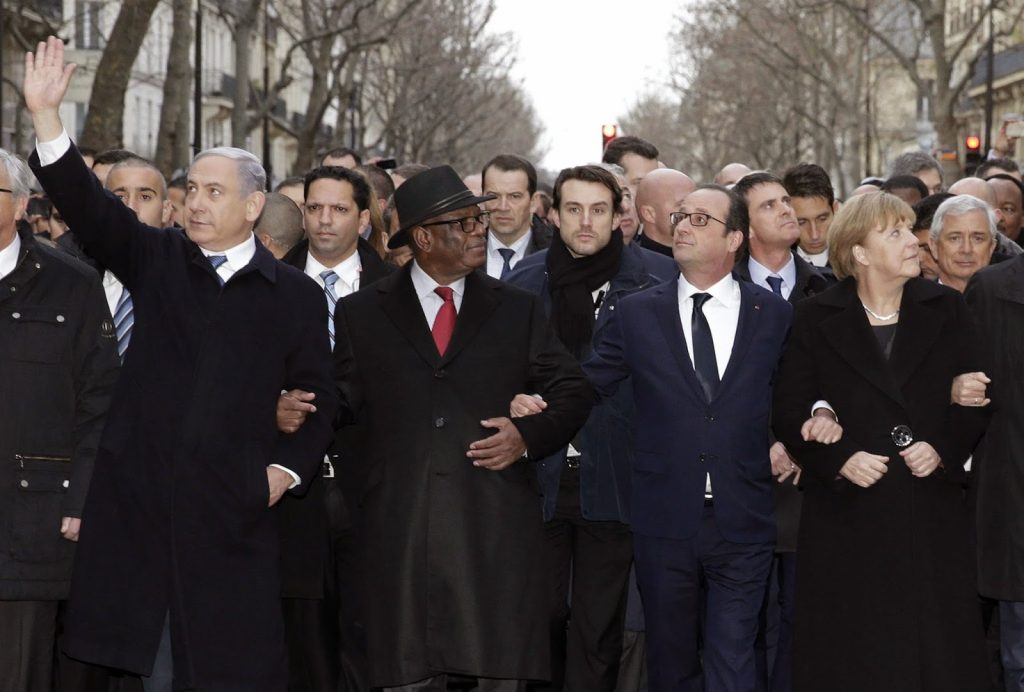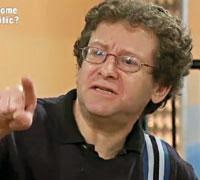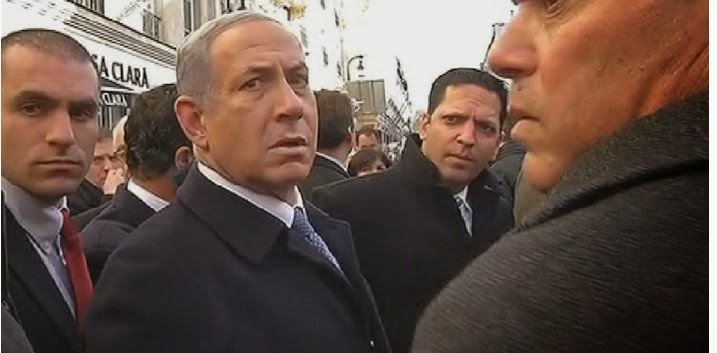hundred years ago, at the time of the Dreyfuss Affair, the founder of Political
Zionism, Theodore Herzl wrote in his Diaries (p.6) that:
 |
| Netanyahu in a happy mood waves to the crowd – every bit of anti-Semitism helps |
 |
| Far right anti-Semite and Zionist, Michal Kaminski MEP at Yad Vashem |
In Paris…, I achieved a freer attitude towards anti-Semitism, which I
now began to understand historically and to pardon. Above all, recognise the
emptiness and futility of trying to ‘combat’ anti-Semitism.
 |
| Tony Greenstein on Big Questions 19.11.2009, Jewish Chronicle – Board of Deputies are Deliberately Encouraging anti-Semitism by saying Jews support Israel |
Herzl was of course wrong. The anti-Semites, who Herzl mixed with and
befriended, including Edouard Drumont, the Editor of La Libre Parole, were
comprehensively defeated in their attempt to frame a Jewish Captain, Alfred Dreyfuss, for
treason. Its repercussions were felt
over 40 years later when the Nazis occupied France. Despite the abandonment of refugee Jews, 75%
of Jews in France survived the Occupation with 30,000 living openly in Paris.
Netanyahu came to France after the attack of a lone anti-Semitic wingnut Amedy
Coulibaly, on a
kosher supermarket in Paris, he came not to offer his support to the French Jewish
community but to complete the work of the anti-Semites.
 |
| The Nazis struck a coin with the Swastika on one side and the Star of David on the Other to Celebrate the Visit of the Head of the Gestapo’s Jewish Desk – Baron von Mildenstein – to Palestine |
down the policy that the Zionist movement has historically had
towards anti-Semitism. Without anti-Semitism there is no Zionism and therefore anti-Semitism is
something to be welcomed. When a gleeful
Netanyahu waved to people in the crowd it was clear that, for him, the attacks
in France were something to enjoy and savour.
Again Herzl anticipated this in his Diaries (p.84) when he wrote
that: ‘“the anti-Semites will be our most dependable
friends... our allies.”
 |
| Netanyahu looks worried as the other leaders abandon him |
Jews living outside Israel do so in ‘exile’ (Galut). It is a unnatural state. That was why so much heat was devoted to the
argument, that led to Israel’s next General Election, about whether Israel should
legally call itself a Jewish State.
Unlike for example Britain, which is nominally a Christian state, being
a Jew in Israel gives you real privileges such as the right to lease 93% of
national land, higher welfare benefits, a Jewish local authority that receives
3+ higher per capita grant than its equivalent Arab authority.
 |
| Palestinians protesting against the Occupation are being ‘anti-Semitic’ according to Netanyahu |
of course the most dangerous place on Earth for Jews. However French and all other Jews make good
immigration fodder in the project to
build one Jewish nation/race in Israel.
The lesson of France is that anti-Semitism must be fought wherever it is found. There will always be a few people who are
taken in by the proclamation of Jewish communal bodies, such as the British Board
of Deputies of Jews, that British Jews stand with Israel in its attacks on Israel. Such people are, wittingly or otherwise, fostering
anti-Semitism. Our job is to break the connection.
who was asked to keep away last week, managed to make a complete fool of
himself and Israel – from shoving aside other leaders to get into the
front row to missing the bus to the
rally and finding himself isolated and angry.
But this apart there was a serious political message.
Greenstein
trip was supposed to be good for Benjamin Netanyahu. The anti-terrorism
march, held on Sunday in Paris in the wake of last week’s gruesome attacks and
which broke attendance records,alongside solidarity marches across France, with
an estimated 3.7 million participants, was supposed to provide the Israeli
prime minister with plenty of opportunities to present himself at his
diplomatic best: marching shoulder-to-shoulder with the likes of German
Chancellor Angela Merkel, holding hands with leaders of the free world,
positioning himself as one of the leaders in the battle against global
terrorism. This was all supposed to remind the world of Netanyahu as powerful, authoritative,
internationally-renowned.
not at all what happened. Netanyahu’s trip to Paris turned into a series of
unfortunate humiliations. First, there was the fact that he had been asked, by French President Francois
Hollande, not to attend the march in an effort to keep the Israeli-Palestinian
conflict out of Europe’s show of unity. Netanyahu initially planned not to go,
but he changed his mind after learning that his two main competitors in the
upcoming election for the votes of the Israeli right-wing, Foreign Minister
Avigdor Lieberman and Economy Minister Naftali Bennet, would be attending.
there was the matter of the march itself, which supplied Netanyahu’s political
rivals with a enough images, videos, gifs and memes for four election
campaigns, not one.
was captured by news cameras elbowing his
way into the front row, gently pushing aside the President of Mali Ibrahim
Boubacar Keita. The French weekly Paris Match later reported that Netanyahu’s
place in the front row (alongside Palestinian President Mahmoud Abbas) was in
fact determined by the organizers of the rally, but by that point the videos
showing Netanyahu’s break into the first row were already out. The damage was
done.
the march Netanyahu was caught off-guard again, waving to the crowd in response
to a pro-Israel shout from the audience, looking rather cheerful in comparison
to his grim and somber compatriots, who kept their cool and did not respond to
the crowd.
waving at the Paris rally. AFP
course, Netanyahu’s biggest humiliation was a video that has since gone viral,
in which he is seen waiting for a bus to take him to the rally, after missing
the bus that ferried other world leaders to the march.
footage, captured by a French TV station, is
remarkable: The prime minister of Israel looks nervous, dejected, beaten down,
surrounded by his security detail yet still standing in the middle of the
street, looking exposed to danger in a way world leaders should never be.
Netanyahu appears furious, annoyed, confused, trying to busy himself with
talking on his phone or fixing his hair, constantly looking over his shoulder
to check whether his bodyguards are still there. Even the French news anchors
had to sympathize with his distress.
captured from BFMTV
time, Netanyah’s anguish over the bus like was memefied and joked about. His
gauche waving became the subject of scorn and derision, his apparent shoving
the subject of intense criticism.
behavior as cutting in line, sneaking onto the bus by pushing and shoving,
using elbows to get to the front at some event is so Israeli, so us, so Likud
Party Central Committee, that I want to shout: “Je suis Bibi!” wrote my Haaretz colleague columnist Yossi
Verter.
Paris disaster could be seen as a campaign stunt that backfired. Lieberman and Bennett had visits that were far more
productive, devoid of PR disasters. Or one could see it as something more
sinister: a disturbing glimpse into the level of isolation Israel has reached
under Netanyahu, and an even more disturbing glimpse at its possible future.
after all, is not a private person. He is an elected official, the elected
leader of the State of Israel. Gauche manners aside, the way that world leaders
treat him is a reflection of what the world thinks of Israel. It wasn’t just
Netanyahu who was excluded from the bus — it was Israel itself. Or, more
accurately, its current policies — its constant building in West Bank settlements,
its disregard for human rights, its unwillingness to negotiate with the
Palestinians, its narrowing
democracy — of which Netanyahu is the chief representative.
that left Netanyahu out in the cold is, after all, the same France that has repeatedly
condemned Israel in the past 12 months, over its construction in
East Jerusalem and its conduct during this summer’s Gaza war. It was only a
month ago that Netanyahu himself called Hollande and beseeched him to halt
the French initiative to have the UN Security Council set a two-year timetable
for reaching a permanent agreement between Israel and the Palestinians,
including a Palestinian state. (France eventually sided with the Palestinians).
The Palestinians’ Security Council bid ultimately failed, but the animosity
toward Netanyahu among European nations (and the Obama administration)
remained.
what happened to Netanyahu in Paris was not deliberate — and given the obvious
security hazards, it is more plausible that it was not — it is still a stunning
metaphor for the depths of isolation Israel has reached in recent years. One
video of Israel’s prime minister, waiting in the cold for a bus that’s not
coming, speaks more loudly than a hundred resolutions recognizing a Palestinian
state.
begins 2015 with its international status at a record low, its supporters
dwindling. It is a liability, a burden. Netanyahu, as prime minister, put it
there.
the joke isn’t just on Netanyahu. It’s on the country that elected him and that
might soon reelect him.
(function(d, s, id) { var js, fjs = d.getElementsByTagName(s)[0];
if (d.getElementById(id)) return; js = d.createElement(s); js.id = id; js.src =
“//connect.facebook.net/en_GB/all.js#xfbml=1”;
fjs.parentNode.insertBefore(js, fjs); }(document, ‘script’,
‘facebook-jssdk’));
Netanyahu defies French pleas to push Zionist agenda
January 2015
Israeli prime minister was asked to avoid Sunday’s march in Paris, out of a
fear he would use the occasion to exploit divisions in French society
– 12 January 2015
hardly surprising that France’s president, Francois Hollande, is understood to
have implored Israeli Prime Minister Binyamin Netanyahu not to participate in
Sunday’s mass march in solidarity with the victims of last week’s killings in
Paris.
was probably the least welcome of the 40 world leaders who participated in the
rally in the French capital to demonstrate their outrage at an attack that left
17 people dead, including four French Jews.
to Israeli media, Hollande’s advisers had urged
Netanyahu not to come, concerned that he would exploit the visit
– and the deaths – to increase divisions in French society.
good grounds for concern. Shortly before he set off for Paris, Netanyahu issued
a statement saying Israel would welcome with “open arms” any French or European
Jews choosing to move to Israel.
he tweeted:
“To all the Jews of France, all the Jews of Europe, Israel is not just the
place in whose direction you pray, the state of Israel is your home.”
also declared on Saturday that he would be convening a special ministerial
committee this week to investigate ways to encourage Jewish migration from
France and from other European countries.
in a coup for the Israeli prime minister, it was announced that four Jewish men
killed at the HyperCacher supermarket in Paris on Friday were being flown to
Israel for burial in Jerusalem on Tuesday. None of them were Israeli citizens.
The four
will be officially recognised
as “terror victims”, possibly entitling their relatives to large
payments from the Israeli government.
Zionist anthem
Hollande’s
concerns were doubtlessly fuelled by Netanyahu’s behaviour at a ceremony for
the victims of an attack on a Jewish school in Toulouse in 2012.
On that
occasion, Netanyahu called on Jews to leave France for Israel and then burst
into a rendition of the Zionist anthem “Am Yisrael Chai”, or
“The people of Israel live”. Hollande was reportedly incensed, saying Netanyahu
had used the event “as an election rally”.
time, presumably in response to Hollande’s rebuke, Netanyahu did slightly temper
his language during his speech at the Great Synagogue in Paris. Conceding that
Jews had a right to live in France, he also averred: “Jews
today have been blessed with another right, a right that didn’t exist for
previous generations: The right to join their Jewish brothers in our historic
homeland – the land of Israel.” Hollande had, by then, left the building.
implication of Netanyahu’s statements has been that France and other western
states are not doing enough to protect their Jewish populations from violent
extremism, and that Israel is the only safe haven for Jews.
would be wrong to view this as some kind of ideological aberration on
Netanyahu’s part. Most other Israeli politicians joined
him in urging French Jews to move to Israel.
Lapid, seen as a centrist politician, said: “I don’t want to speak in terms of
Holocaust, but … European Jewry must understand that there is just one place
for Jews, and that is the State of Israel.”
the effort to bring Jews to Israel is at the core of Zionist thinking, and
widely supported by the Israeli Jewish population. Aliyah, or “ascension”, the
Hebrew word for Jewish immigration, connotes an almost-divine obligation on
Jews to live in Israel.
Prime Minister Ariel Sharon, it should be remembered, used even more
inflammatory language in 2004, warning
that France was in the grip of “the wildest anti-semitism”, and calling on Jews
to flee France.
have to advise our brothers in France, I’ll tell them one thing – move to
Israel, as early as possible. I say that to Jews all around the world, but
there [in France] I think it’s a must and they have to move immediately.”
Israel has tried to exploit economic crises in countries with significant
Jewish populations to encourage them to emigrate. In 2001, when the Argentinian
financial system collapsed, Israel offered each Jew there a $20,000 cheque –
should they make a new life in Israel.
in addition to the inducements Israel offers as standard to Jewish immigrants:
large sums of cash, tax breaks, subsidies, as well as special access to grants
and loans.
extraordinary lengths Israel is prepared to go to encourage Jews to come to
Israel – including, it seems, even actions designed to fuel anti-semitism –
were suggested by Raanan Rein, a history professor at Tel Aviv University, in a
book on Israel’s relations with Argentina.
to Rein, in 1960, David Ben Gurion, Israel’s prime minister,
welcomed the possibility that Israel’s kidnapping of Nazi war criminal Adolf
Eichmann – in violation of an extradition agreement with Buenos Aires – might
fuel hatred of the country’s Jews.
is anti-Semitism,” he told a journalist, “they [Argentina’s Jews] can immigrate
to Israel.”
and observers have pointed out that Netanyahu, Israeli politicians more
generally and organisations such as the Jewish Agency, which oversees
immigration to Israel, may equally be provoking hatred – inadvertently or
otherwise – that strengthens Jewish immigration.
a connection between Israel’s intensifying belligerency, especially its
repeated attacks on Gaza, and verbal and physical attacks on Jews in Europe.
specifically in France, reports of attacks on Jews over the past decade have
been well-publicised,
including by the Jewish Agency, even though a significant proportion have
turned out to be false.
with half a million Jews, has the largest Jewish population outside the US and
Israel. According to figures from the Jewish Agency, 7,000 immigrants arrived
from France in 2014, triple the number in 2012. Israel’s minister for immigrant
absorption, Sofa Landver, has predicted
that more than 10,000 will immigrate this year.
hailing her ministry’s successes last month, Landver said
the government would continue “to promote the ingathering of the exiles, a
vision that has accompanied the people of Israel since the state’s
establishment”.
contrast, Rabbi Menachem Margolin, head of the European Jewish Association, noted
that Netanyahu’s efforts risked “severely weakening and damaging Jewish
communities that have the right to live securely wherever they are”.
graphic terms, Haaretz columnist Chemi Shalev argued:
“By encouraging mass emigration, Israeli politicians could very well be helping
terrorist fanatics finish the job started by the Nazis and their Vichy collaborators:
making France Judenrein.”
assumptions, he added, “can only invigorate jihadists and spur them to adopt
similar tactics in other European countries”.
Jewish immigration so important to Israel that it is prepared to endanger the
very Jews it claims to protect?
reason is illustrated in the efforts of Netanyahu and the Israeli right to pass
a basic law defining Israel as “the nation-state of the Jewish people”.
of such legislation, echoing the major goals of Zionism, are several and
related:
consolidate Israel’s long-standing efforts to claim it is the state of all Jews
around the world, conflating Judaism with Zionism and helping to silence
critics of Israeli policy as anti-Semites.
implicate all Jews in Israeli actions to Judaise territory that was seized from
Palestinians, as part of Israel’s efforts to prevent the emergence of a
Palestinian state.
recruit more Jews to counter the so-called “demographic threat” posed by the
Palestinians’
higher natural growth rate, which threatens to create a
Palestinian majority in the combined area of Israel and the occupied
territories.
bolster a self-serving narrative of Israel as being on the frontlines of the
clash of civilisations, in which the future of the Judeo-Christian west is
threatened by a bloodthirsty Islamic east.
therefore entirely predictable that Netanyahu used his speech in Paris on
Sunday to again characterise the Palestinian resistance movement Hamas, and
Lebanon’s Hizballah as being no different from militant jihadist groups such as
al-Qaeda and the Islamic State that were implicated in last week’s attack.
he said, wanted to “impose a dark tyranny on the world”.
“Those
who slaughtered Jews in the synagogue in Jerusalem [in November] and those who
slaughtered Jews and journalists in Paris belong to the same murderous terror
organisation,” Netanyahu claimed.
worth recalling that Netanyahu let slip
in the immediate wake of the attack on the World Trade Centre his real view of
that event – it was “very good” for Israel because it would generate sympathy
for its war against the Palestinians.
columnist Anshel Pfeffer noted
this narrative worked to Netanyahu’s benefit, allowing him to refuse “to make
meaningful concessions to the Palestinians since Israel is on the frontline
facing the onslaught of radical Islam, and any ground given will immediately be
used to launch further attacks”.
Israeli analyst, Orly Noy, took the
same view: “This helps Netanyahu promote a worldview in which
there is no national conflict, no occupation, no Palestinian people and no
blatant disregard for human rights.”
Pfeffer further observed, Netanyahu’s narrative that all Jews should come to
Israel depends on a central fallacy: that Israel is a safe haven. In fact,
statistically Jews are far safer in France than in conflict-plagued Israel.
forgets that at least some of Israel’s power on the international stage has
depended on the influence of international Jewish lobbies to pressure
politicians and the media through their activism.
a point Rabbi Margolin alluded
to. “The Israeli government must recognise this reality and also
remember the strategic importance of the Jewish communities as supporters of
Israel in the countries in which they live.”
be worth Netanyahu pondering that a United States and a Europe without
organised Jewish lobbies aggressively promoting Israel’s interests would be
less reliable allies than they have been until now.
more at: